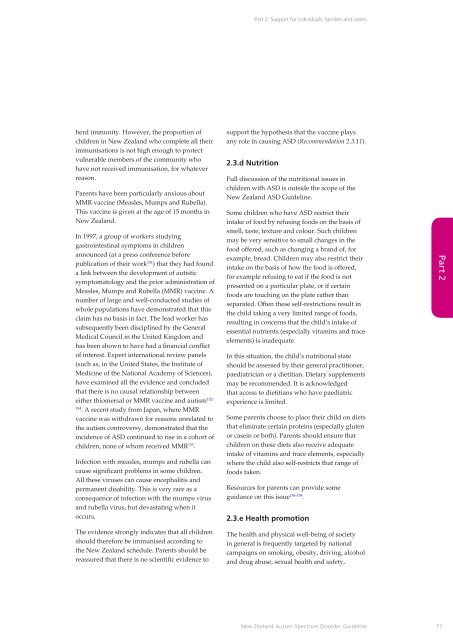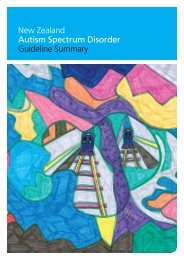New Zealand Autism Spectrum Disorder Guideline - Ministry of Health
New Zealand Autism Spectrum Disorder Guideline - Ministry of Health
New Zealand Autism Spectrum Disorder Guideline - Ministry of Health
You also want an ePaper? Increase the reach of your titles
YUMPU automatically turns print PDFs into web optimized ePapers that Google loves.
Part 2: Support for individuals, families and carers<br />
herd immunity. However, the proportion <strong>of</strong><br />
children in <strong>New</strong> <strong>Zealand</strong> who complete all their<br />
immunisations is not high enough to protect<br />
vulnerable members <strong>of</strong> the community who<br />
have not received immunisation, for whatever<br />
reason.<br />
Parents have been particularly anxious about<br />
MMR vaccine (Measles, Mumps and Rubella).<br />
This vaccine is given at the age <strong>of</strong> 15 months in<br />
<strong>New</strong> <strong>Zealand</strong>.<br />
In 1997, a group <strong>of</strong> workers studying<br />
gastrointestinal symptoms in children<br />
announced (at a press conference before<br />
publication <strong>of</strong> their work 151 ) that they had found<br />
a link between the development <strong>of</strong> autistic<br />
symptomatology and the prior administration <strong>of</strong><br />
Measles, Mumps and Rubella (MMR) vaccine. A<br />
number <strong>of</strong> large and well-conducted studies <strong>of</strong><br />
whole populations have demonstrated that this<br />
claim has no basis in fact. The lead worker has<br />
subsequently been disciplined by the General<br />
Medical Council in the United Kingdom and<br />
has been shown to have had a financial conflict<br />
<strong>of</strong> interest. Expert international review panels<br />
(such as, in the United States, the Institute <strong>of</strong><br />
Medicine <strong>of</strong> the National Academy <strong>of</strong> Sciences),<br />
have examined all the evidence and concluded<br />
that there is no causal relationship between<br />
either thiomersal or MMR vaccine and autism 152-<br />
154<br />
. A recent study from Japan, where MMR<br />
vaccine was withdrawn for reasons unrelated to<br />
the autism controversy, demonstrated that the<br />
incidence <strong>of</strong> ASD continued to rise in a cohort <strong>of</strong><br />
children, none <strong>of</strong> whom received MMR 155 .<br />
Infection with measles, mumps and rubella can<br />
cause significant problems in some children.<br />
All these viruses can cause encephalitis and<br />
permanent disability. This is very rare as a<br />
consequence <strong>of</strong> infection with the mumps virus<br />
and rubella virus, but devastating when it<br />
occurs.<br />
support the hypothesis that the vaccine plays<br />
any role in causing ASD (Recommendation 2.3.11).<br />
2.3.d Nutrition<br />
Full discussion <strong>of</strong> the nutritional issues in<br />
children with ASD is outside the scope <strong>of</strong> the<br />
<strong>New</strong> <strong>Zealand</strong> ASD <strong>Guideline</strong>.<br />
Some children who have ASD restrict their<br />
intake <strong>of</strong> food by refusing foods on the basis <strong>of</strong><br />
smell, taste, texture and colour. Such children<br />
may be very sensitive to small changes in the<br />
food <strong>of</strong>fered, such as changing a brand <strong>of</strong>, for<br />
example, bread. Children may also restrict their<br />
intake on the basis <strong>of</strong> how the food is <strong>of</strong>fered,<br />
for example refusing to eat if the food is not<br />
presented on a particular plate, or if certain<br />
foods are touching on the plate rather than<br />
separated. Often these self-restrictions result in<br />
the child taking a very limited range <strong>of</strong> foods,<br />
resulting in concerns that the child’s intake <strong>of</strong><br />
essential nutrients (especially vitamins and trace<br />
elements) is inadequate.<br />
In this situation, the child’s nutritional state<br />
should be assessed by their general practitioner,<br />
paediatrician or a dietitian. Dietary supplements<br />
may be recommended. It is acknowledged<br />
that access to dietitians who have paediatric<br />
experience is limited.<br />
Some parents choose to place their child on diets<br />
that eliminate certain proteins (especially gluten<br />
or casein or both). Parents should ensure that<br />
children on these diets also receive adequate<br />
intake <strong>of</strong> vitamins and trace elements, especially<br />
where the child also self-restricts that range <strong>of</strong><br />
foods taken.<br />
Resources for parents can provide some<br />
guidance on this issue 156-158 .<br />
2.3.e <strong>Health</strong> promotion<br />
Part 2<br />
The evidence strongly indicates that all children<br />
should therefore be immunised according to<br />
the <strong>New</strong> <strong>Zealand</strong> schedule. Parents should be<br />
reassured that there is no scientific evidence to<br />
The health and physical well-being <strong>of</strong> society<br />
in general is frequently targeted by national<br />
campaigns on smoking, obesity, driving, alcohol<br />
and drug abuse, sexual health and safety,<br />
<strong>New</strong> <strong>Zealand</strong> <strong>Autism</strong> <strong>Spectrum</strong> <strong>Disorder</strong> <strong>Guideline</strong> 77











